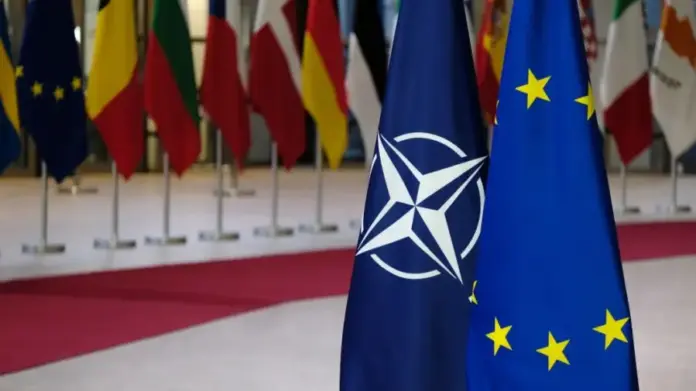The Republic of Moldova is entering a stage of strategic maturity, complementing its EU accession goal with efforts to strengthen national security and ensure compatibility with Euro-Atlantic structures. During the panel “Foreign Relations (Cluster VI)” at the conference “Enlargement Report 2025: Progress and Future Priorities of the Republic of Moldova,” government officials, diplomats, and experts outlined how Chisinau is reconfiguring its position between neutrality, resilience, and international cooperation in defense.
Participants highlighted that Moldova has moved beyond survival diplomacy and now actively adapts to European standards in foreign and security policy. The European Commission’s report confirms this progress: Moldova’s alignment with the EU’s common foreign and security policy grew from 80% in 2023 to 91% in 2024. This convergence demonstrates strategic and political compatibility with NATO, the EU’s key security partner.
Mihai Mogildea, expert at the Institute for European Policies and Reforms (IPRE), stated that for the first time, Moldova is taking part in European defense instruments, benefiting from millions of euros through the European Peace Facility to modernize defense capabilities, train personnel, and strengthen cybersecurity.
Experts clarified that this openness redefines neutrality rather than contradicts it. Constitutional neutrality does not mean isolation but rather selective cooperation with international organizations to build defense capacity. Moldova remains a neutral state, but now acts as an active, interconnected member of the European security network, cooperating with NATO without compromising its legal status.
“The drone incidents highlight the security risks that persist even for EU member states, not just for candidate or neutral countries like the Republic of Moldova. And here comes the ‘elephant in the room’: Moldova’s neutrality, without cooperation, becomes a vulnerability. We do not have sufficient capacity to finance all the necessary initiatives from the state budget, nor do we have a modernized security architecture to face new challenges. That is why we must take full advantage of what is happening within the European Union, which now treats defense and security as a new priority. In the coming period, European-level spending on security and defense will increase fivefold, to over 130 billion euros,” explained Andrei Curararu, public policy and security expert at the WatchDog.MD Community.
“First of all, I think we must continue everything related to participation in the European Peace Facility, and here we can signal our intention to participate as a neutral state. We should think about investments in air defense, engineering defense, and participation in international missions. We also have a civilian mission here that helps us in the cyber field, which was crucial during the last elections. We witnessed billions of cyberattacks on infrastructure during the electoral period, and we must expect them to continue over the next decade. We are also talking about the Eastern Flank Watch — in fact, a complex monitoring mechanism that the Republic of Moldova could join. We are currently in a gray monitoring zone — between Ukraine, which has strengthened these capacities, and Romania, a NATO member state that has also expanded its capabilities in this area. Investments in all types of sensors — acoustic or visual — as well as in the ability to intercept potential drones entering Moldovan airspace, are absolutely compatible with our candidate status.”
“The third direction on this roadmap, which we must discuss, concerns one of the major investments the European Union will make — in dual-use infrastructure, meaning everything from bridges and roads to other critical structures. I believe our Ministry of Defense should consider how to align with European integration through capacity-building and modernization of the national army, while also finding creative ways to use these funds — for example, by investing in bridges over the Prut River, in disaster response capabilities, and in combating disinformation. Another clear necessity is joining the European Military Semester, which helps plan acquisitions and identify shortcomings. The Republic of Moldova, when making acquisitions, will certainly not receive the same offers as the European Union on a larger scale. We must ultimately understand that all interactions with the European Union in the military field strengthen Moldova’s neutrality. A so-called neutrality declared or promoted through Telegram channels, with absurd notions such as economic neutrality or others, does not strengthen the Republic of Moldova — it weakens it,” the expert concluded.
Foreign Minister Mihai Popsoi emphasized that Moldova must move from being a passive beneficiary of Western security to a proactive contributor to regional stability. He identified humanitarian missions, crisis management, and support for the Eastern neighborhood as tangible steps in this direction. To support this, Chisinau created a specialized structure within the Ministry of Foreign Affairs to manage international assistance and legal frameworks — a requirement of the European Commission in assessing Moldova’s accession readiness.
This new external orientation is also supported by diplomatic actions that strengthen the image of the Republic of Moldova as a responsible and solidary state. The assumption of the presidency of the Council of Europe, planned for next year, is a moment to assert Moldova as a promoter of democracy, rule of law, and combating disinformation – all components of societal resilience, a priority area for NATO.
Experts concluded that European integration inherently involves Euro-Atlantic cooperation. Moldova is gradually building political, technical, and institutional interoperability with NATO, even without formal membership on the horizon. In the face of regional instability and the war in Ukraine, this cooperation is not optional — it is essential for Moldova’s security and sovereignty.


